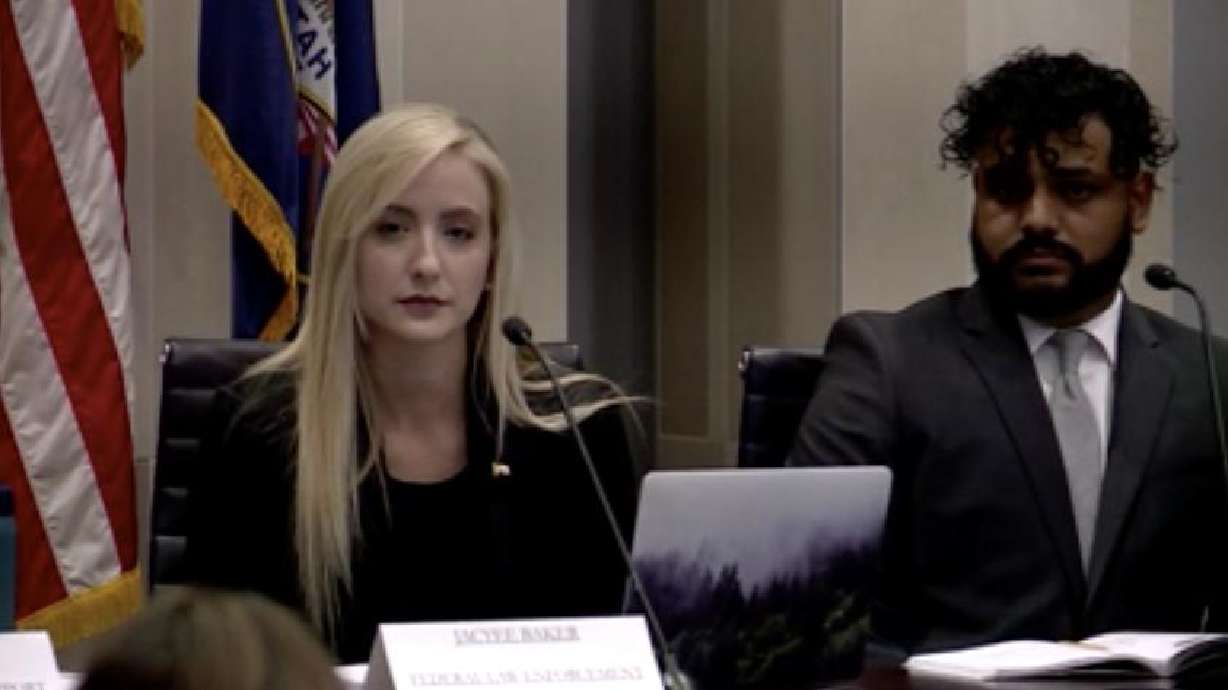Estimated read time: 4-5 minutes
This archived news story is available only for your personal, non-commercial use. Information in the story may be outdated or superseded by additional information. Reading or replaying the story in its archived form does not constitute a republication of the story.
SALT LAKE CITY — The closest comparison for the counterterrorism simulations University of Utah law students experienced Friday is none other than the widely popular fantasy tabletop live-action role-playing game, Dungeons and Dragons.
"Instead of Dungeons and Dragons, what we're doing is we're simulating real-world inspired terrorist attacks," said Zach Becerra, a third-year law student at the U. who helped design the simulation.
The annual event — designed and led by students at the S.J. Quinney College of Law — challenges law and graduate students at the U. to address legal, moral and operational dilemmas in real time as they respond to simulated terrorism scenarios around the globe.
The daylong simulation is the culmination of a semester-long class called Global Perspectives on Counterterrorism, taught by law professor Amos Guiora, a retired lieutenant colonel of the Israel Defense Forces Judge Advocate General Corps and expert in terrorism and geopolitics.
Creating the simulation
Creating four different terrorism scenarios for the simulation is no small task, Becerra said.
"There's a reason there's six people on the design team and that we're overseen by a person like Amos Guiora. It takes someone with the professionalism of somebody who'd been with the Judge Advocate General Corps in the Israeli military to kind of reign in all our creativity and focus our energies," Becerra said. "It's very difficult."
"It takes about a year to make today happen," Guiora said.
The design process begins with deciding what dimension of terrorism the team will design around. Some of the different scenarios involve themes from the class, such as cyber terrorism, traditional terrorism and white supremacy, Becerra said.
"Once we've decided what we're going to focus on, we then generate a narrative that explains or draws out of the team, decision-making requirements that involve different aspects of domestic and international law," Becerra said.
The six-person design team does inherit a lot of the work from design teams that have come before them, but they still have to enhance the previous work along with updating the simulation scenarios to account for changing geopolitical situations.
"The Ukraine crisis, for example, (it's) not something anyone foresaw, (it) happened very recently, and we had to rush to incorporate a lot of the elements of that crisis into today's exercise," Becerra said
Becerra added that it was important to incorporate those elements into the scenarios due to the fact that all of Friday's scenarios dealt with American partners overseas.
Simulation day
Students from Guiora's Global Perspectives on Counterterrorism class are divided into four teams, and the simulations begin early in the morning and run late into the night.
"Each team has either six students or five students, in which they address (and) resolve the various dilemmas (and) the scenarios," Guiora said. "After the scenarios, we have a 45-minute congressional panel, which is comprised of alumni who took this class a number of years ago."
During this panel, students are asked "robustly" to address, explain and defend the decisions they made during the course of the simulation.
Guiora added that the class is unique in the sense that it requires students to resolve complex policy and legal scenarios, all while working collaboratively in a team environment.
In the week following the simulation, Guiroa meets with each student individually for an oral exam surrounding the simulation.
"They themselves may have been a rock star — could be — but if they can't explain and justify the decisions their team made, that will reflect on their grade," Guiroa said.
Due to the large amounts of information that each team is fed throughout the course of the simulation — some of it sound and some of it misinformation — constant communication among teammates is key to the success of the team, Guiroa said.
"If you're not constantly updating each other, there's no way that you can perform well," he said. "There really is no other such class in the United States."
Along with being unique, the simulation also carries extreme relevancy and importance.
"I can't overstate how important it is that the body politic of the United States of America understands that we are attempting, in this simulation, to educate the up-and-coming, future decision-makers of the intelligence community and the United States legal apparatus so that when they encounter these situations in the future, they're capable, qualified and prepared to make difficult decisions in real-time for the best interest of the country and its people," Becerra said.










